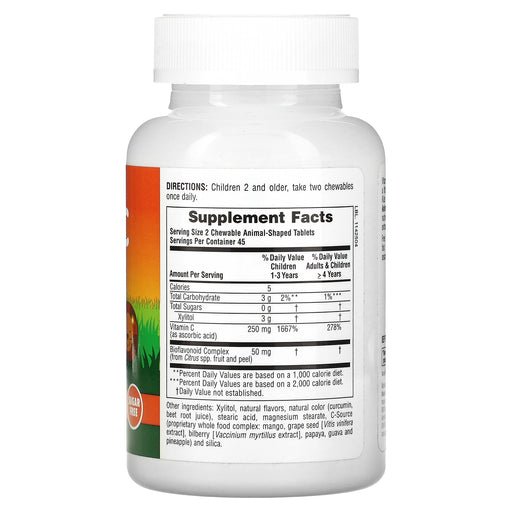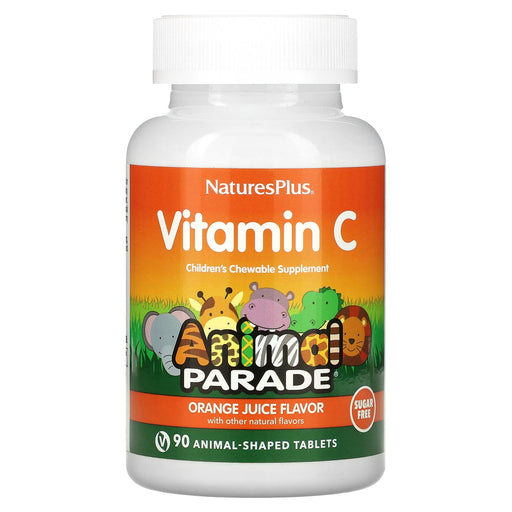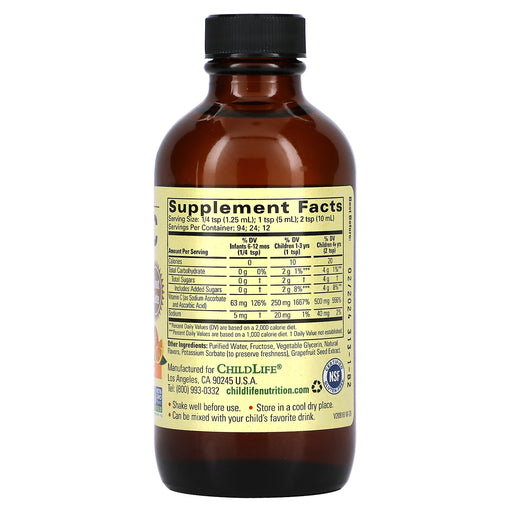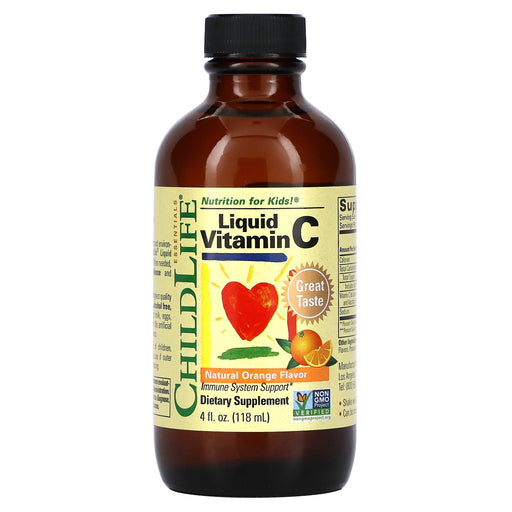
Supporting Your Child's Immune Health and Well-Being with Vitamin C
As a parent, you want to give your child the best possible foundation for a healthy life. One essential nutrient that plays a vital role in supporting your child's immune system, growth, and overall well-being is vitamin C. Children's vitamin C supplements can help ensure your child receives an adequate supply of this crucial vitamin, even if their diet falls short.
The Importance of Vitamin C in a Child's Health
Vitamin C, also known as ascorbic acid, is a water-soluble vitamin that offers numerous health benefits for children. Some of the key functions of vitamin C include:
- Immune System Support: Vitamin C helps stimulate the production and function of white blood cells, which are essential for fighting off infections and illnesses.
- Collagen Synthesis: Vitamin C is necessary for the production of collagen, a protein that plays a crucial role in the growth and repair of tissues, including skin, bones, and cartilage.
- Antioxidant Protection: As a powerful antioxidant, vitamin C helps protect cells from damage caused by free radicals, which can contribute to the development of chronic diseases.
- Iron Absorption: Vitamin C enhances the absorption of non-heme iron from plant-based sources, helping to prevent iron-deficiency anemia.
- Wound Healing: Adequate vitamin C intake supports the body's natural wound healing process by promoting collagen formation and tissue repair.
While many fruits and vegetables, such as citrus fruits, berries, and leafy greens, are excellent sources of vitamin C, picky eating habits or limited access to fresh produce may make it challenging for some children to meet their daily requirements. This is where children's vitamin C supplements can help bridge the gap.
Benefits of Children's Vitamin C Supplements
Incorporating a high-quality children's vitamin C supplement into your child's daily routine can offer several potential benefits, including:
- Consistent Nutrient Supply: Vitamin C supplements provide a reliable source of this essential nutrient, ensuring your child receives an adequate amount each day.
- Immune System Support: Regular vitamin C supplementation can help support your child's immune system, reducing the risk and severity of common illnesses like colds and flu.
- Convenient and Palatable: Children's vitamin C supplements often come in child-friendly forms, such as chewable tablets or gummies, making them easy and enjoyable for kids to take.
- Antioxidant Protection: Supplemental vitamin C can help bolster your child's antioxidant defenses, protecting their cells from oxidative stress and supporting long-term health.
- Complementing a Balanced Diet: While supplements should never replace a balanced diet, they can help fill nutritional gaps and ensure your child receives optimal levels of vitamin C.
Choosing the Best Children's Vitamin C Supplement
When selecting a vitamin C supplement for your child, it's essential to choose a high-quality product from a trusted brand. Consider the following factors:
- Age-Appropriate Dosage: Look for supplements that provide an appropriate daily dose of vitamin C for your child's age and needs.
- Quality and Purity: Choose supplements manufactured in GMP-certified facilities, free from artificial additives and contaminants, and third-party tested for purity and potency.
- Bioavailable Forms: Opt for supplements that contain highly bioavailable forms of vitamin C, such as ascorbic acid or sodium ascorbate, for optimal absorption and utilization.
- Child-Friendly Formulations: Consider supplements with pleasant flavors and easy-to-take forms, such as chewable tablets or gummies, to ensure your child will take them consistently.
- Additional Nutrients: Some children's vitamin C supplements may include other immune-supportive nutrients, such as zinc or elderberry, for added benefits.
Tips for Incorporating Vitamin C Supplements into Your Child's Routine
To maximize the benefits of children's vitamin C supplements and support your child's overall health, consider the following tips:
- Pair with a Balanced Diet: While supplements can help fill nutritional gaps, they should be used in conjunction with a balanced diet rich in fruits, vegetables, and other nutrient-dense foods.
- Follow Dosage Instructions: Always adhere to the recommended dosage on the product label, and consult with your child's pediatrician before starting any new supplement regimen.
- Encourage Healthy Habits: Model and encourage healthy lifestyle habits, such as regular exercise, adequate sleep, and frequent handwashing, to support your child's immune health.
- Store Properly: Keep vitamin C supplements in a cool, dry place, away from direct sunlight and out of reach of children.
Support Your Child's Health with Quality Vitamin C Supplements
By incorporating a high-quality children's vitamin C supplement into your child's daily routine, you can help support their immune health, growth, and overall well-being. With a commitment to purity, potency, and your child's individual needs, Health Orchard offers a range of vitamin C supplements designed to provide the essential nutrition your child needs to thrive.
Explore our selection of children's vitamin C supplements and witness the power of this crucial nutrient in supporting your child's health. With the right tools and a proactive approach, you can help your child build a strong foundation for a lifetime of wellness.
Frequently Asked Questions about Children's Vitamin C
1. What is the best vitamin C for children?
The best vitamin C supplement for children is one that is age-appropriate, easy to take, and made by a reputable company. Some top-rated options include:
- Nature's Way Alive! Children's Chewable Vitamin C
- NOW Foods Kid Vits Chewable Vitamin C
- ChildLife Essentials Vitamin C
- Pure Encapsulations Liposomal Vitamin C Liquid
- Garden of Life mykind Organics Kids Organic Vitamin C Spray
2. Should children take vitamin C supplements?
Children who eat a balanced diet rich in fruits and vegetables may not need vitamin C supplements. However, some children may benefit from supplementation if they:
- Have limited access to fresh fruits and vegetables
- Are picky eaters or have restricted diets
- Have certain medical conditions that increase vitamin C requirements (e.g., smoking, malabsorption disorders)
- Are recovering from an illness or surgery
Consult a pediatrician to determine if vitamin C supplementation is necessary for your child.
3. Can a child take 1000mg of vitamin C?
The recommended daily allowance (RDA) of vitamin C for children varies by age:
- 1-3 years: 15 mg
- 4-8 years: 25 mg
- 9-13 years: 45 mg
- 14-18 years: 65-75 mg
Taking 1000 mg of vitamin C per day is significantly higher than the RDA for children and may cause side effects such as diarrhea, nausea, and abdominal cramps. Megadoses of vitamin C are not recommended for children unless prescribed by a healthcare provider for specific medical conditions. Always consult a pediatrician before giving high doses of vitamin C to children.
4. How much vitamin C should a child take?
The recommended daily allowance (RDA) of vitamin C for children varies by age:
- Birth to 6 months: 40 mg (adequate intake)
- 7-12 months: 50 mg (adequate intake)
- 1-3 years: 15 mg
- 4-8 years: 25 mg
- 9-13 years: 45 mg
- 14-18 years: 65-75 mg
These amounts can typically be obtained through a balanced diet that includes fruits and vegetables. If supplementation is necessary, consult a pediatrician for personalized dosage recommendations.
5. What brand of vitamin C for kids?
Some reputable brands of vitamin C supplements for kids include:
- Nature's Way Alive! Children's Chewable Vitamin C
- NOW Foods Kid Vits Chewable Vitamin C
- ChildLife Essentials Vitamin C
- Pure Encapsulations Liposomal Vitamin C Liquid
- Garden of Life mykind Organics Kids Organic Vitamin C Spray
- Nordic Naturals Vitamin C Gummies
- Llama Naturals Plant-Based Vitamin C Gummies
When choosing a brand, look for:
- Age-appropriate formulations
- Quality ingredients
- Third-party testing for purity and potency
- Reputable manufacturers
- Easy-to-take forms (gummies, chewables, liquids)
Consult a pediatrician for personalized recommendations and to ensure proper dosage and safety for your child.
6. Why do kids need vitamin C?
Kids need vitamin C for several essential functions in their growing bodies:
- Collagen formation: Vitamin C is necessary for the production of collagen, a protein that provides structure and support to skin, bones, and connective tissues.
- Immune function: Vitamin C helps support the immune system by stimulating the production and function of white blood cells.
- Antioxidant protection: As an antioxidant, vitamin C helps protect cells from damage caused by free radicals.
- Iron absorption: Vitamin C enhances the absorption of non-heme iron from plant-based sources, which is important for preventing anemia.
- Wound healing: Adequate vitamin C intake supports proper wound healing by promoting collagen formation and reducing inflammation.
- Brain development: Vitamin C plays a role in the synthesis of neurotransmitters and may support cognitive development.
Ensuring adequate vitamin C intake through a balanced diet or supplementation (under the guidance of a pediatrician) is important for supporting children's overall health and development.












